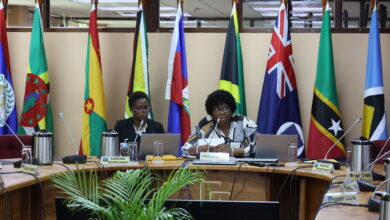“Diabetes causes death and disability. Complications from diabetes can lead to heart attack, stroke, blindness, kidney failure and lower limb amputation. This disease can adversely affect both the quality and length of your life, and screening for diabetes should be part of your routine health checks,” stated CARPHA Executive Director Dr. Joy St. John in observance of World Diabetes Day 2021.
Diabetes is one of the most common non-communicable diseases (NCDs). According to the IDF Diabetes Atlas, North America and the Caribbean are ranked 4th in the world with an age-adjusted comparative diabetes prevalence in adults 20-79 years of age of 11.1 %. Projected prevalence in 2030 and 2045 are 12.3% and 13.0% respectively.[1] In 2019, the country in the Americas with the highest age-standardised mortality (excluding chronic kidney disease) due to diabetes was Guyana with 82.6 deaths per 100, 000 population. Several Caribbean countries were in the top ten and include 3rd Trinidad and Tobago, and 4th Haiti at 69.6 and 68.2 per 100,000, respectively. (PAHO 2019)[2]
The COVID-19 pandemic has disrupted services for the prevention and treatment of NCDs, affecting global efforts to control diabetes. Persons living with diabetes are at a higher risk of developing severe COVID-19 symptoms and are among the most impacted by the pandemic.
It is important that our health systems make every effort to meet the health care needs of people living with and affected by NCDs. CARPHA encourages Member States to strengthen their systems to ensure support and care are accessible to all persons with diabetes, and the availability and equitable distribution of essential medicines and insulin.
The Caribbean Public Health Agency (CARPHA) provides technical support to Member States to improve access to care for persons living with diabetes and minimise the impact of the disease. Raising the Bar: CARPHA Guidelines on the Management of Diabetes in primary care and COVID-19, a five-part webinar series hosted by CARPHA in 2020, aimed to disseminate the standard of care for diabetes, and provide an update on diabetes clinical management and COVID-19 infection.
Available, quality-assured, affordable medicines and technologies are part of a major strategy for reducing the burden of NCDs, such as diabetes. The Agency continues to assess the quality of medications available in the Region through testing and analysis, surveillance and regulation, and promoting pharmacovigilance of medicines for diabetes management.
The Agency, in collaboration with the Organisation of Eastern Caribbean States (OECS) updated the CARPHA Guidelines on the Management of Diabetes in Primary Care in the Caribbean. These guidelines offer instructions on care for persons with diabetes (PwD), and are intended to support, strengthen and standardise the management of diabetes and improve outcomes in care of diabetes in Member States. CARPHA has also hosted training for health professionals to support the implementation of these guidelines in their respective countries.
Type 2 diabetes is the most common form of the disease and can be prevented. The effects can be avoided or delayed with diet, physical activity, medication and regular screening and treatment for complications. Cultural norms which steer people away from healthy lifestyles within the Caribbean are a major contributing factor. It is important for persons to place their health before personal preferences.
If you are at risk of Type 2 diabetes, lifestyle changes can help prevent the onset of Type 2 diabetes. This includes:
- Avoiding tobacco use
- Eating a healthy diet which includes at least 5 servings of fruits and vegetables each day and reduce intake of fats and sugars
- Remaining physically active – at least 30 minutes of regular moderate-intensity physical activity on most weekdays (for adults); and 60 minutes moderate to vigorous physical activity everyday (for children)
- Maintaining a normal body weight
With the right treatment and care, persons living with diabetes can live a healthy life. For those already affected, the good news is that you are in control, and can prevent complications from diabetes by
- taking your medication as instructed by a health care provider
- having regular screening and treatment for complications
- practicing a healthy lifestyle.
World Diabetes Day is observed annually on 14 November. The theme for 2021 to 2023 is Access to Diabetes Care.
###






